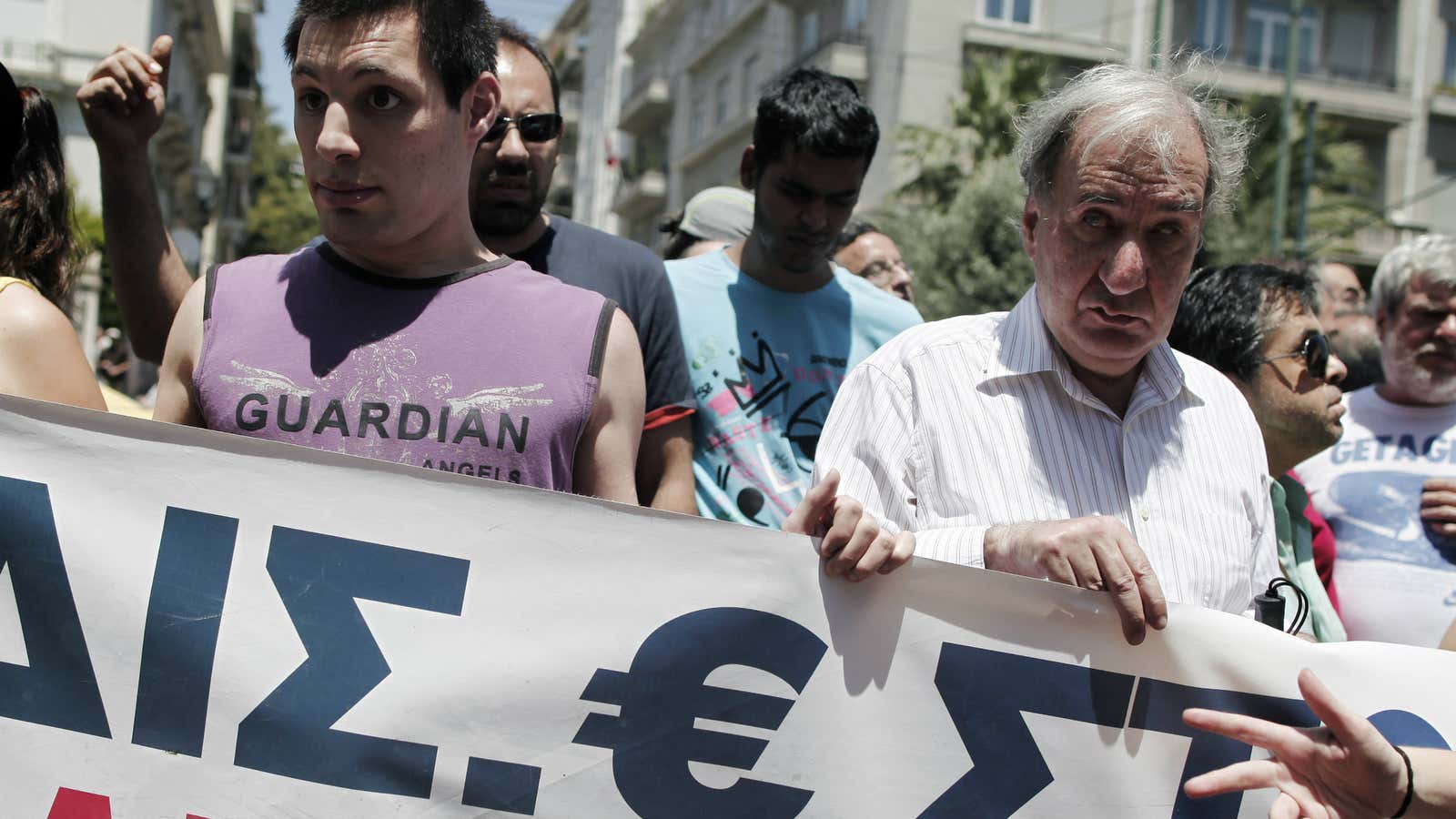In March 2012, Greece became the first modern, advanced economy to default on its debts since World War II. On Wednesday, the IMF published a post-mortem (pdf) about its attempts to bail out the country with other members of the so-called troika—the European Central Bank and representatives of other euro zone countries.
The IMF still contends that bailing out Greece was a “necessity.” But not only does the report show that the Fund dramatically underestimated the scale of the crisis caused by Greece, it explains why the IMF had to leave its better judgment behind to manage a new systemic threat. In truth, however, the IMF’s screw-ups hint at why the Fund never should have been involved in the euro zone at all.
The IMF always wants the last word.
The IMF is used to working in situations in which it is the ultimate authority, and can act quickly to make decisions. Normally, a struggling country and its creditors are desperate for help and don’t have much leverage in negotiations.
The IMF usually works with weak, developing economies, but even in its work with developed economies, it has typically had the upper hand. In 1976, it loaned the United Kingdom £2.3 billion ($3.5 billion). More recently, the Fund even helped out Iceland. But in both cases, recipients had little choice but to accept the help.
In the case of Greece, the country was desperate enough, but there were too many cooks in the kitchen for the IMF to take control. In its report, the IMF cited disagreements with the ECB, the European Commission, and European leaders, which risked slowing down the implementation of the bailout program:
From the Fund’s perspective, the EC, with the focus of its reforms more on compliance with EU norms than on growth impact, was not able to contribute much to identifying growth enhancing structural reforms. In the financial sector, the ECB had an obvious claim to take the lead, but was not expert in bank supervision where the Fund had specialist knowledge.
It can’t tackle massive systemic problems.
Although the IMF has been involved in major crises before, it admits it had never faced a problem of this magnitude. The Fund knew that Greece posed a systemic risk, and that’s why it relaxed its standards for offering bailouts to help the country. But it seriously misread the kind of support Greece actually needed to stifle a crisis of confidence across the euro area.
Initially, it offered Greece what’s called a “Stand-By Agreement,” an emergency borrowing program limited to three years. In retrospect, the report says, it should have offered something else—an “Extended Fund Facility”—which would have allowed Greece to make adjustments over a longer period. Had the IMF stepped in sooner with a long-term plan, Greece may not have been forced to live up to the impossible standards of a three-year deal. That’s why the subject of a Greek default or Greek exit from the euro came up over and over again, adding to pressures on countries like Ireland, Portugal, Spain, and Italy.
Even beyond this oversight, the IMF just isn’t built to tackle problems that have to do with financial contagion in the world’s biggest banks. It recognized that Greece’s problems were not limited to Greece, but the Fund had little power to impose deeper reforms on the euro area as a whole.
It needs to be impartial.
The IMF doesn’t have a good track record for winning hearts and minds, and that was evident in the case of Greece. “Reform efforts in Greece under the program might have been more enduring if more visible progress had been made with regard to getting those on high incomes to pay their taxes,” the IMF noted. Limited political support undermined public involvement, with riots in early 2012 and repeat parliamentary elections later that year.
Instead of serving as a liaison between Greeks and northern Europeans, the IMF’s report shows it mostly took the side of the angry creditors, even at the expense of the Greeks. Reforms may have been inevitable, but Germany, France, and others could have imposed them on their own.
In its report, the IMF suggests that if Greece had defaulted on its debt early on in the euro crisis, yet remained in the euro currency, its problems would have been more contained. Greek GDP has always been a small fraction of total euro area output, and its problems stem from fundamental imbalances between northern and southern Europe. But instead of looking to itself for support, the euro area turned outwards, beseeching the IMF to mitigate the Greek disaster. In retrospect, the IMF should have refused to get involved.
